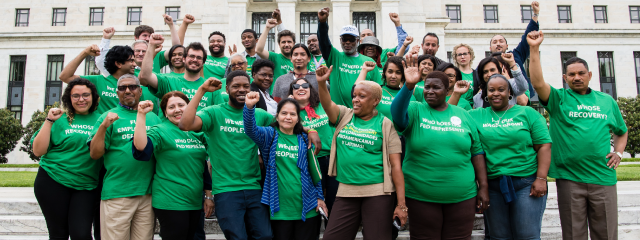Introducing the High Road Workweek Partnership

On November 13 Fair Workweek Initiative Director Carrie Gleason joined Darrion Sjoquist, a Starbucks Barista and member of Working Washington, and Charlie Dewitt from scheduling technology company Kronos, on a panel about the issue of workforce scheduling at “Next:Economy” A summit of leading business and technology thinkers.
During the panel, Darrion spoke about Starbucks’ persistent understaffing, the resulting last-minute scheduling changes and the barriers he and other Starbucks workers face taking sick leave, and the impact of these policies on him and his co-workers. Charlie spoke about Kronos’ new scheduling equity software, developed in consultation with the Fair Workweek Initiative and our academic partner Susan Lambert, that gives employers the tools to help them track their scheduling practices, measure core scheduling metrics, but also demonstrate how sustainable schedules influence staffing retention and company profitability. Carrie went on to unveil the High Road Workweek Partnership, a new, groundbreaking approach to incorporate employee voice and scheduling equity values into technology and management practices.
The High Road Workweek Partnership responds to a recognition by many industry leaders that they can no longer defend scheduling practices that ignore their employees’ obligations outside of work and their need for stable incomes.
Many employers are realizing that predictable, stable and flexible work schedules are not just good for employees, but are essential to meeting operational, sales and growth objectives. A new paradigm is needed to create schedules that are balanced and equitable. Scheduling technologies can be a part of the solution, but a company’s values, policies and practices, as well as real input from employees, will ultimately determine how effectively a company transitions to the next generation of work schedules.
The Center for Popular Democracy’s High Road Workweek will use three key components to help employers develop and maintain a new approach to scheduling:
- A Partnership of Core Stakeholders: through stakeholder engagement, employers assess the impact of their current scheduling practices and envision a sustainable workweek;
- The High Road Workweek Pledge: a commitment to scheduling practices that promote Predictability and Stability, Adequate Hours, Employee Input and Flexibility, and Equal Opportunity and Mobility; and
- Measurable Implementation and Assessment: innovative technologies, clear metrics and guidance for managers, paired with ongoing employee feedback and a research-based evaluation.
The High Road Workweek Partnership is currently seeking employers to participate in the initial pilot project. We are confident that the partnership will deliver lasting scheduling solutions and provide a framework for employers to achieve sustainable work schedules that evolve with the changing business landscape and the dynamic needs of their employees.












